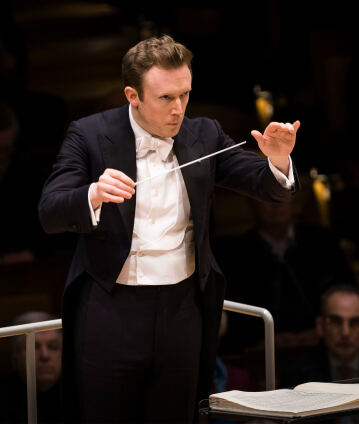Daniel Harding conducts Bruckner’s Fifth Symphony

Posterity has given Anton Bruckner’s Fifth Symphony the most varied soubriquets, from the "Tragic", the "Faustian", and the "Catholic", while the composer himself spoke of his "Fantastic" Symphony. Above all, it demonstrates the variety of worlds of expression that can be found in this monumental work – from ruminative whispering to incandescent displays of bravura. The concert is conducted by Daniel Harding.
What a find! In 1904, a retired civil servant of the Imperial and Royal Ministry of Railways came across on a handwritten score from the pen of Anton Bruckner among the papers of his recently deceased father-in-law. The sensation was by no means that this work was previously unknown – it was after all Bruckner’s Fifth Symphony which had been premiered under the direction of Franz Schalk in Graz on 9 April 1894. Rather, what caused a sensation was the fact that this manuscript had a dedication. It showed that three years after its completion, Bruckner had dedicated his Fifth “with deepest respect” to Karl Ritter von Stremayr. In his function as Minister of Public Instruction, Stremayr had confirmed Bruckner’s appointment as a lecturer of harmony and counterpoint to the University of Vienna in 1875. The composer expressed his thanks by making a neat copy of his Fifth Symphony with a dedication, dated 4 November 1878 – Stremayr’s name day – which remained in Stremayr’s private possession until his death.
Bruckner’s Fifth was heard for the first time on 20 April 1887 in a transcription for two pianos in the Bösendorfersaal in Vienna. The first orchestral performance took place in the absence of the composer seven years later in a version which often falsely represented Bruckner’s intentions: the conductor shortened the large-scale work by about 15 minutes, and at the same time added an off-stage orchestra to the score in best operatic style. Since Schalk also published his version in 1896, it set the path for the further reception of the Fifth. Interest in the original form of the work was revived only through the spectacular find of Stremayr’s copy of Bruckner’s score. Since then, it seems indisputable that the Fifth appears to presage Bruckner’s appointment to the University of Vienna: the work, which Bruckner himself is said to have once described as his “contrapuntal masterpiece” is a perfect example despite its large-scale formal structures of compositional economy and movement stringency.
With Daniel Harding, who learned his trade as an assistant to conductors such as Claudio Abbado and Sir Simon Rattle, and who made his debut with the Philharmoniker when he was just 21, this exceptional work by Bruckner is in the best possible hands.
© 2018 Berlin Phil Media GmbH
Related interviews
Artists
Our recommendations
- 2024 Europakonzert with Daniel Harding and Lisa Batiashvili from Tsinandali (Georgia)
- Daniel Harding conducts Berlioz’s “Roméo et Juliette”
- Daniel Harding conducts Mahler’s Symphony No. 10
- Daniel Harding conducts Debussy, Ligeti, Sibelius and Britten
- Daniel Harding conducts Schumann’s “Scenes from Goethe’s Faust”
- Daniel Harding conducts Beethoven’s “Pastoral”